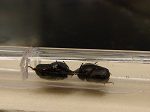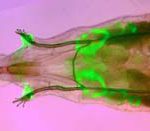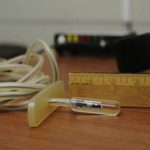Predoctoral Trainees

Christine Bergeon Burns
Christy’s predoctoral research examined the evolution of hormone-mediated suites of traits. Hormones are important mediators of life-history trade-offs, and the multiple targets of hormones may facilitate or constrain adaptive divergence. Her research asked whether relationships between the hormone testosterone and phenotypic traits observed in one population of a songbird, the Dark-eyed junco (J. hyemalis), are consistent or different across a divergent subspecies facing different selective pressures. Further, Christy investigated how variation in neural androgen sensitivity may relate to these hormone-phenotype relationships. After completing postdoctoral study at Louisiana State University, Christy was the Director of the CISAB Mechanisms of Behavior Lab. Christy is currently a Certified Genetic Counselor at Spectrum Health.
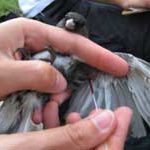

Stephanie Campos
Stephanie’s dissertation addressed how chemical signals and specific elements within these signals impact territorial space use, and vary with habitat or signaler traits in Sceloporus lizards. This diverse genus possesses specialized scent glands on the inner thighs that exude waxy chemical secretions. She is particularly interested in understanding how these complex odor signals mediate social and sexual interactions. Her research integrates field studies of behavior with chemical and microbial analysis techniques in the lab to ask about the relative roles of signaler or receiver physiology and environment in shaping chemical communication. Stephanie is currently an Assistant Professor in the Biology Department at Villanova University.
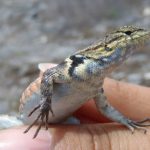

Elizabeth Carlton
Elizabeth’s predoctoral research investigated the endocrine signals that regulate seasonal variation in sickness responses and how endocrine signals of metabolic fuel availability mediate energetic trade-offs between reproduction and immunity. She was particularly interested in the roles that glucose, insulin, and leptin may play in these processes. Elizabeth explored her research questions with ecoimmunological techniques and endocrine assays in Siberian hamsters. She received her PhD in 2015 and then earned a Masters in Secondary Education and Teaching Sciences. She went on to be a junior high science teacher in the greater Chicago area.


Amy Cash
Amy’s predoctoral research used the fruit fly (Drosophila melanogaster) as a model to examine the genetic pathways that regulate gametogenesis and the correct production of female and male gametes. Specifically, her research focused on understanding two critical components of gamete production: the correct establishment of sexual identity in germ cells and the proper maintenance and differentiation of female and male germline stem cells. By studying genes involved in these processes, her research provided insight into the specific genetic pathways that underlie gamete production. Amy Cash Ahmed is now a lab manager in the lab of Gene Robinson at the University of Illinois.


Amy Dapper
Amy’s predoctoral research focused on evolution of conditionally expressed traits. Specifically, she examined how juvenile hormone regulates male and sex-dimorphic horns in the dung beetle genus Onthophagus. By better understanding how developmental mechanisms contributes to variation in the degree and direction of horn polymorphisms, her research will help to elucidate important factors underlying the evolutionary origins of morphological diversity. Amy also does evolutionary theory. She was a GTSP postdoctoral fellow in the Laboratory of Genetics at the University of Wisconsin, Madison, Advisor: Dr. Bret Payseur. Amy is currently an Associate Professor in the Department of Biological Sciences at the University of Mississippi.
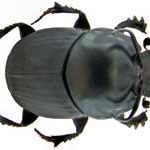

Caro Diemel
Caro’s dissertation work investigated to which extent present and developmental environmental conditions affect the production of ovarian steroid hormones that mediate adult reproductive capacity in human females. She explored these questions by focusing on the interaction between glucocorticoid levels and the production of progestogens and estrogens across one menstrual cycle while controlling for past and present anthropometric and socioeconomic factors in healthy pre-menopausal women from Germany. Caro used liquid-chromatography-tandem-mass-spectrometry to measure these hormones in non-invasively collected urine samples in collaboration with the Endocrinology Laboratory at the Max Planck Institute for Evolutionary Anthropology in Leipzig, Germany. She is currently a Technician at the University of Vienna.


Mollee Farrell
Mollee’s predoctoral research examined sex differences in behavioral, physiological, and morphological responses to chronic stress. Specifically, she investigated how gonadal hormones contribute to stress-induced changes in medial prefrontal cortex and amygdala in both males and females. Her research aims to characterize the relationship between sex differences and alterations in structure and function in the corticolimbic circuit due to stress. Mollee conducted postdoctoral research at Northeastern University under the guidance of Rebecca Shansky.
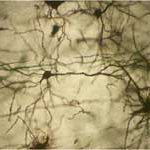

Amanda Gibson
Amanda studied the role host-parasite coevolution plays in the evolution and maintenance of sexual reproduction, using a mixed (sexual and asexual) population of freshwater snails in New Zealand. She also studied the effect of coevolution on the evolution of reduced antagonism in C. elegans and its virulent bacterial pathogen, Serratia. She also conducted a phylogenetic test of the Red Queen Hypothesis using nematodes and their various pathogens. Amanda did a postdoctoral fellowship at Emory University as part of NIH’s Fellowships in Research and Science Teaching program, and was awarded the John Maynard Smith Prize as an outstanding young evolutionary biologist by the European Society for Evolutionary Biology; she was also a co-winner of the TH Huxley Prize from the Society for the Study of Evolution. This is a prestigious prize for contributions to education by a young research scientist. Amanda is now an Associate Professor at the University of Virginia. 
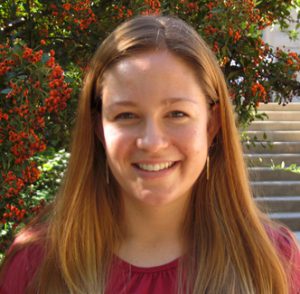
Rachel Hanauer
In an increasingly urban world, it is necessary to understand the effects of living in urban habitats on animals. Rachel’s dissertation asked 1) How do urban animals differ from non-urban conspecifics? And 2) What processes lead to these phenotypic differences? One aspect of urban environments is the frequency of anthropogenic stressors, and so in her dissertation she targeted the physiological responses to acute stressors. The glucocorticoid stress response coordinates many systems, including immunity and behavior. She was interested in the interactions between hormones, immunity, and parasitism, and so she studied hormones and immune function in the context of parasites, both at the scale of the individual bird’s infections and the prevalence within a population. Her dissertation examined the effects of disturbance on stress responsiveness, immunity, and parasitism both by observing existing variation in the field birds, and by manipulating frequency of disturbance in captivity. Rachel is currently pursuing a career in nursing.


Winnie Ho
Winnie’s predoctoral research focused on the evolution of the physiological mechanisms that underlie sexually dimorphic behavior. Specifically, she investigated how the neuroendocrine pathways regulating electrocommunication behavior in black ghost knifefish (Apteronotus albifrons), differ across populations that show variation in the magnitude of sexual dimorphism in those electrocommunication signals. Winnie completed her PhD in 2013 and went on to do postdoctoral research with Stacey Smith at the University of Colorado, studying the evolution of the molecular pathway that regulates flower coloration. She then was an NSF Math-Bio postdoctoral fellow in the lab of Jeff Riffell at the University of Washington, studying the co-evolution of insect olfactory systems with the odorants used for pollinator vs. prey attraction in carnivorous plants. She is currently a Senior Medical Writer for Penumbra, Inc.


Aubrey Kelly
Aubrey Kelly’s predoctoral research focused on the ways in which nonapeptides (vasopressin- and oxytocin-like peptides) and dopamine systems modulate social, reproductive, and anxiety-like behaviors in sex- and phenotypic-specific ways in songbirds. Aubrey completed her PhD in 2014 and then became an NIH National Research Service Award (NRSA) Fellow doing postdoctoral research with Alexander Ophir at Cornell University. Aubrey is currently an Associate Professor at Emory University in the Department of Psychology, Neuroscience & Animal Behavior Program.
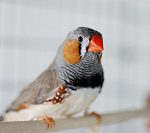

Ali Ossip-Klein
Alison’s research investigated the physiological and environmental factors that shape the evolution of sexual dimorphism in color across Sceloporus lizard species. She was particularly interested in the role of color as an aggressive signal as well as the evolutionary causes and consequences of signal loss. Alison explored these questions using behavioral studies in the field and phylogenetic comparative methods in the lab. She completed her PhD in 2015 and is now an Assistant Professor of Environmental Science in the Department of Chemistry and Physical Sciences at Marian University.


Mark Peterson
Mark’s predoctoral research focused on the role of hormone-mediated gene expression in explaining behavioral and physiological differences between the sexes. Males and females share nearly identical genomes, yet often differ dramatically in both appearance and behavior. Understanding the ways in which gene expression explains these differences allows investigation into dimorphism and suggests ways in which species divergence may proceed. Because hormones often differ between the sexes, and correlate with dimorphic phenotypes, it is important to understand their role in developing and maintaining sexual dimorphism and individual variation. Mark received his PhD in 2013 and is currently employed as a Data Scientist at Life Sciences Innovation, but continues collaborations with former colleagues and is interested in big data.
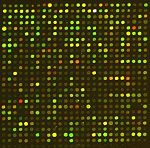

Jakki Petzold
Jakki studied sex differences in electric organ discharges (EODs) and the modulations in EOD frequency and amplitude used as communication signals (“chirps”) in the South American ghost knifefish, Parapteronotus hasemani. She was interested in how fish perceive and discriminate among conspecific EODs and chirps. She completed her PhD in 2016, and is currently working an Assistant Research Scientist in the Center for Postsecondary Research at Indiana University.
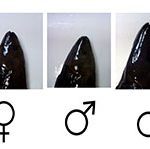

Nikki Rendon
Nikki’s work converged on the interactions among ecology, physiology, and behavior. Her dissertation work provided insights into the physiological mechanisms regulating female aggression, and how these mechanisms change with reproductive state and across seasons. As sex steroid hormones are known to mediate the expression of competitive traits and behaviors, she focused on the specific factors that regulate hormone synthesis and function. Nikki’s work bridged multiple levels of complexity by delineating the interactions among androgens, estrogens and their respective tissues of action in order to describe how specific attributes of physiology coalesce to mediate aggression. Nikki received her PhD in 2016 and is currently Senior Director, Medical & Scientific Affairs at Avant Healthcare.


Lauren Rudolph
Lauren’s research focused on the role of estrogens in the development of the spinal nucleus of the bulbocavernosus (SNB), a sexually dimorphic motor nucleus that controls erections and ejaculations in rats. Estrogen-controlled SNB development occurs during a critical period, and her research focused on the mechanisms by which the estrogen sensitivity of SNB motoneuron morphology is limited to this developmentally restricted critical period. Specifically, she was interested in the roles of estrogen receptor alpha (ERα) and brain-derived neurotrophic factor (BDNF) in mediating estrogen-dependent SNB dendrite growth during the early postnatal period. She completed her PhD in 2014. After conducting postdoctoral research at UCLA under the direction of Dr. Paul Micevych, she is now an Assistant Professor of Neuroscience at Kenyon College.
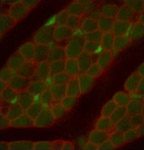

Sam Slowinski
Sam’s research focused on host-parasite coevolution and disease transmission. He studied the effect of antagonistic coevolutionary interactions with parasites on the evolution of host breeding systems in an experimental Caenorhabditis elegans nematode host/ Serratia marcescens bacterial parasite laboratory system. Additionally, he worked with dark-eyed juncos (Junco hyemalis) in the field in order to assess the mechanisms by which haemosporidian parasites alter the attractiveness of birds to disease vectors. Sam is currently an Assistant Professor in the School of Biological Sciences at the University of New England.
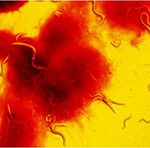

Melissa Toups
Melissa’s predoctoral research investigated the process of sex-chromosome formation and the genomic consequences of sex-chromosome evolution. Sex chromosomes are thought to be instrumental in resolving sexual antagonism through their sex-biased or sex-specific inheritance. Melissa’s research examined how sexual conflict is resolved by studying evolution of nonmodel sex-chromosome systems, such as birds (ZZ/ZW), monotremes (multiple-X), and the mosquito Aedes aegypti (homomorphic sex chromosomes). Specifically, she studied gene movement, sex-biased gene expression, and structural changes associated with the evolution of sex chromosomes in these systems. Melissa completed her PhD in 2014 and pursued postdoctoral studies at the University of Texas. She is currently an Assistant Professor of Evolutionary Biology at the University of Louisiana at Lafayette.
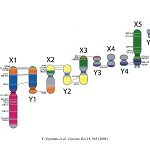

Leah Wilson
Leah’s research focused on the neuroendocrine mechanisms underlying seasonal variation in flocking and aggression. She was interested in investigating the roles that the nonapeptides (vasopressin- and oxytocin-like peptides), vasoactive intestinal polypeptide, and corticotropin-releasing hormone play in modulating the seasonal expression of affiliative and aggressive behavior in male and female songbirds. Leah completed her PhD in 2016 and is currently an Assistant Professor of Neuroscience at Muhlenberg College.




